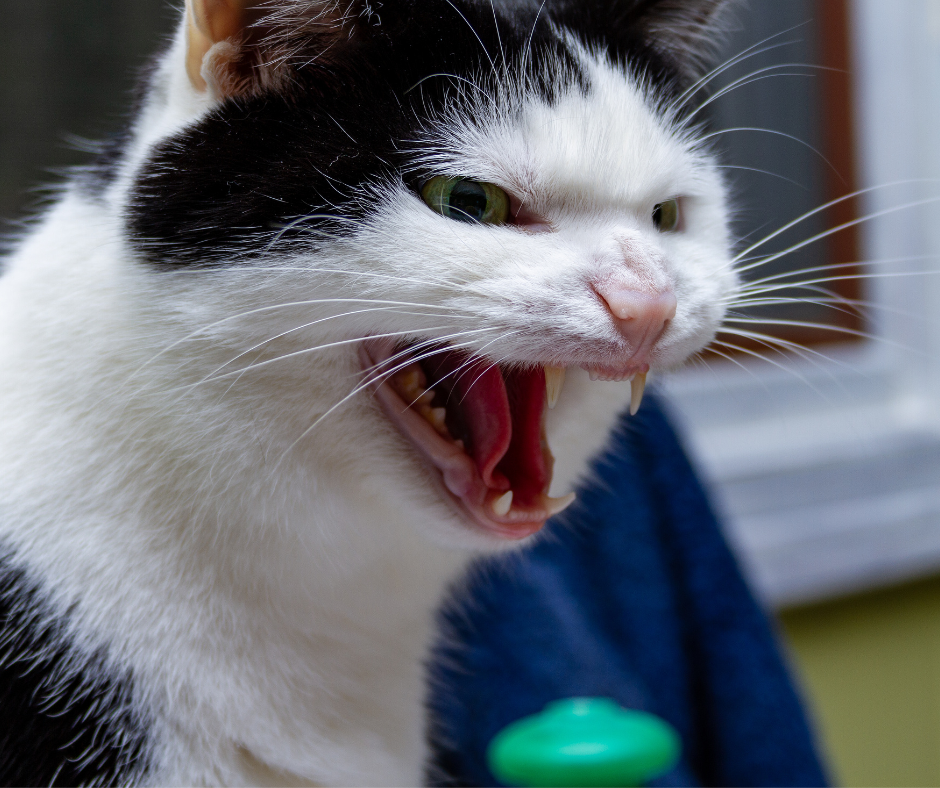Have you ever noticed your pet behaving in ways that seem out of the ordinary? Perhaps your dog is counter-surfing, your cat is suddenly skittish, or your pet just seems to be acting out of character. As a pet owner, it can be confusing and frustrating to deal with these “unwanted” behaviors. But what if there’s more to the story? What if these behaviors, which we label as “undesired” or “acting out,” are simply expressions of unmet needs or an attempt to communicate with us?
Our companion animals don’t have the same language we do, so they express themselves through their actions. Often, these behaviors are perfectly normal from their perspective. The key to helping them is first understanding why they’re acting out.
Common Causes of Unusual Behavior in Pets
- Pain or Illness
If your pet is experiencing pain or illness, they may act out in unexpected ways. Sudden aggression, withdrawal, or a change in appetite could all signal that something is physically wrong. It’s important to rule out medical issues before assuming your pet is just being “difficult.” - Boredom
Pets need mental and physical stimulation. A lack of activity or variety in their day can lead to behaviors like destructive chewing, excessive barking, or even depression. Providing toys, puzzles, or interactive games can help keep their minds engaged. - Lack of Exercise
Pets, especially dogs, need regular exercise to stay balanced and calm. Without sufficient physical activity, they may release pent-up energy in ways that seem like misbehavior—such as jumping, hyperactivity, or chewing on furniture. - Lack of Environmental Enrichment
Just like humans, animals need enrichment to feel fulfilled. If their environment lacks stimulation—such as new sights, sounds, or smells—they may resort to behaviors like digging, scratching, or escaping in search of more exciting surroundings. - Anxiety or Stress
Anxiety can manifest in various ways, including pacing, barking, hiding, or aggression. This could be triggered by a new pet or child in the family, changes in routine, or a traumatic past experience. If your pet feels unsafe or unsure, they may act out to cope with their stress. - Fear
Fear is a powerful motivator for unusual behavior. Whether it’s a loud noise, an unfamiliar person, or a past trauma, animals may react defensively when they feel threatened. Understanding the root of their fear is key to addressing it compassionately. - Unclear Boundaries and Expectations
Pets need structure and guidance to feel secure. Without clear boundaries, they may act out simply because they don’t know what is expected of them. Jumping on guests or begging at the table may be seen as “misbehavior,” but from the pet’s perspective, they might not understand that this is unacceptable. - Misunderstanding or Lack of Guidance
In many cases, pets are labeled as misbehaving when they simply don’t understand what we want from them. A dog that jumps on a stranger, for example, may be showing exuberance, not aggression. When we misunderstand their motivations, it can lead to frustration for both the pet and the owner. - Lack of Socialization
Pets that haven’t been properly socialized or exposed to a variety of experiences during their developmental stage may react fearfully or aggressively to new situations. This lack of experience can lead to anxiety and confusion, resulting in behaviors like growling, barking, or avoiding new people or pets.
How Animal Communication Can Help
As an animal communicator, I’ve seen firsthand how understanding a pet’s motivations can make all the difference. Many times, what appears to be “acting out” is really a cry for help or an expression of unmet needs. By communicating with your pet, we can open a dialogue to understand what they’re trying to tell us.
For example, if a dog jumps on a stranger, it’s easy to assume they’re being aggressive or poorly trained. But what if, through communication, we find out that the dog is simply overexcited and greeting the person with excess energy? In this case, the solution is not punishment but rather teaching the dog how to greet people calmly. Understanding the motivation behind the behavior allows us to choose the correct strategy for modification.
Animal communication can be beneficial in cases where:
- There is a change in routine, such as a new pet or child in the household.
- A pet has experienced trauma and is reacting out of fear.
- There is uncertainty around boundaries and expectations in the home.
- The pet’s behavior seems to change suddenly, indicating potential health issues or emotional distress.
Addressing Animal Behavior with Compassion
Every behavior has a cause, and it’s our job as caretakers to find the root of that behavior. When we take the time to understand our pets—whether through observation, training, or animal communication—we can create an environment where they feel safe, understood, and happy.
By working with an animal communicator, you can get answers “straight from the horse’s mouth,” so to speak. Instead of guessing why your pet is acting out, you can gain direct insight into their thoughts, feelings, and needs. This not only saves time and effort but also deepens your bond with your animal.
Choosing the Right Approach
If your pet is displaying unusual behavior, don’t rush to label it as misbehavior. Take a step back and consider the possible causes. Are they in pain? Bored? Anxious? By understanding their motivations—and potentially using animal communication—you can find the right approach to help your pet feel more secure and supported.
Remember, every behavior tells a story. It’s up to us to listen, understand, and respond with compassion. Your pet isn’t trying to “act out”—they’re trying to communicate. And with the right tools, we can make sure their message is heard.



